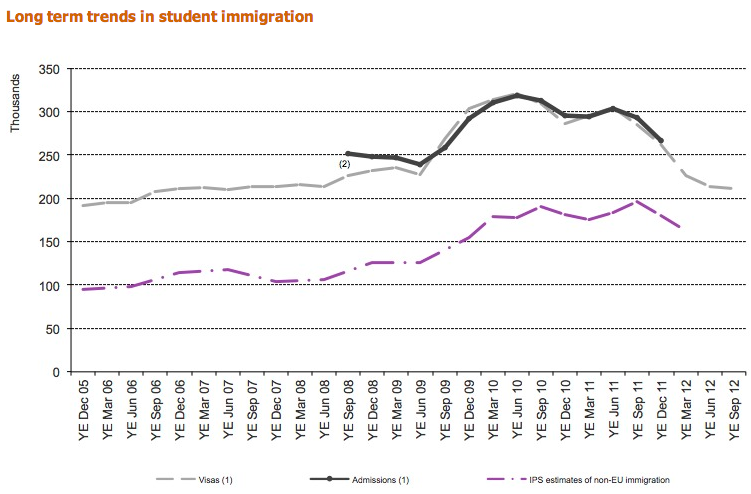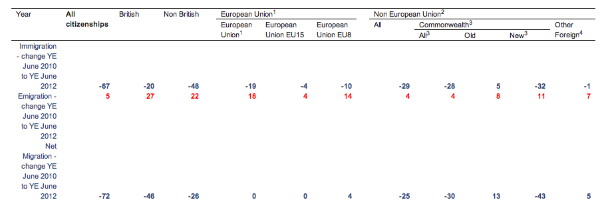What's behind the fall in net migration?
[This piece was corrected and updated on March 8 2013]
With immigration proving to be a key issue in last week's Eastleigh by-election, Labour has stepped up its campaigning on the issue. In a political party broadcast posted yesterday on the Labour party website, Ed Miliband admitted the Labour Government had made mistakes on immigration policy when in power.
The Shadow Home Secretary Yvette Cooper told the Today Programme this morning that immigration needs to be controlled, but not indiscriminately.
Join 72,953 people who trust us to check the facts
Sign up to get weekly updates on politics, immigration, health and more.
Subscribe to weekly email newsletters from Full Fact for updates on politics, immigration, health and more. Our fact checks are free to read but not to produce, so you will also get occasional emails about fundraising and other ways you can help. You can unsubscribe at any time. For more information about how we use your data see our Privacy Policy.
According to Ms Cooper it's important to make a distinction between different kinds of immigration: she spoke out against "exploited immigration" - something which we looked into yesterday when we reported on minimum wage breaches - and said that "we should be supporting university students who come to Britain and invest in Britain".
Instead what we're seeing, according to the Shadow Home Secretary, is "a squeeze on university students." Is this true?
The Home Office graph below chimes with ONS figures which show that in 2010 there were 238,000 people arriving to study in the UK. In 2011 this number dropped to 232,000, with 213,000 migrants arriving to study in the year to March 2012.

In its 2012 study on immigration, the Home Office reported a 29% fall in the number of sponsored student visa applications, and a 26% fall in the number of study visas issued. Both are a measure of Tier 4 student visa numbers, which are included in net migration targets (although those issued to visiting students are not).
The Home Office also reported that:
"Admissions of those for the purposes of study in 2011 (267,000) have also fallen by 10% compared to 2010 (296,000). The International Passenger Survey estimates for long term student migration for the year ending March 2012 have fallen by 7% (163,000) compared with the previous 12 months (175,000)."
However, it's worth pointing out these statistics show that the falls were concentrated in the private further education sector. Falls of 62%, 69% and 14% were registered, respectively, in the further education sector, English language schools and independent schools. According to a Home Office spokesporson, there has been evidence in these sectors of misuse of the student visa system.
So while it is true that student visa numbers have reduced, the fall covers a spectrum of further and higher education institutions. In fact, if we look at foreign students applying for a visa because they've been accepted at university, the numbers have increased.
That's not all. Ms Cooper also added that two-thirds of the decline is "actually accounted for by more Brits leaving the country and fewer Brits coming home again." However, the Quarterly Migration Statistics published last week by the Office for National Statistics show that since 2008 there's been a drop in the number of people emigrating from the UK:
We contacted Ms Cooper's office to ask for a source for the claim, and were sent a copy of a House of Commons Library note. This states that:
"Net migration of British nationals has fallen by 46,000, from -33,000 in the year to June 2010 to -79,000 in the year to June 2012. Over the same period, total net migration has fallen by 72,000, from 235,000 to 163,000. So the fall in net migration of British nationals was equal to almost two-thirds (64%) of the total fall in net migration over this period."
The figures quoted by Ms Cooper match data gathered through the International Passenger Survey and by the Home Office and also published in the ONS Migration Report, which has shown that emigration of British citizens has been gradually increasing, while net migration of British citizens was indeed -79,000 in the year ending June 2012.
Once again, however, there is a caveat.
Though the House of Commons Library states that the fall in net migration of British nationals was equal to almost two thirds of the total, it's worth bearing in mind this is not the same as saying that two thirds of the fall is accounted for by this change, as Ms Cooper concluded.
Because net migration is a composite number that takes account of both people leaving and arriving in the country, we can't trace the causes of rises or falls by looking at one group in isolation. For example, as the table below shows, while the net 46,000 Brits who left the country between June 2010 and June 2012 is proportionate to approximately two thirds of the 72,000 drop in net migration overall, so is the 43,000 net drop in migration from the New Commonwealth: taken together, they would account for over 100% of the total net migration figure.

(Source: ONS Migration Report)
Correction: In the original piece we wrote that the Home Office registered a 26% fall in the number of study visas issued. "The latter are issued for short-term courses of study (around 6 months) - which cannot be extended - and are therefore not included in the net migration targets." This is incorrect.
We have also changed our rating of the accuracy of the claims, and have expanded our analysis of the net migration figures and what they mean.
----
Flickr image courtesy of Jon Rawlinson